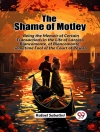Maria Edgeworth’s ‘Leonora’ is a captivating exploration of the complexities of human emotion, societal expectations, and the nature of self-identity in the early 19th century. Set against a backdrop of romantic entanglements and spirited dialogues, Edgeworth employs a sophisticated narrative style that blends realism with irony. The novel’s rich character development and intricate plotting reflect the literary context of the time, marked by the rise of the psychological novel and a burgeoning interest in moral philosophy, making it an essential study for understanding women’s literature and the evolution of the novel. Edgeworth, an influential figure in Anglo-Irish literature, often drew from her own life experiences and the socio-political climate of her era to inform her writing. Her upbringing in Ireland, along with her keen observations of both British and Irish societies, enabled her to infuse ‘Leonora’ with a nuanced critique of the gender norms and class structures of her time. As a pioneering novelist, Edgeworth’s focus on strong, intelligent female characters exemplifies her commitment to challenging the gender dynamics of her day. ‘Leonora’ is a must-read for anyone interested in early feminist literature or the development of the modern novel. Readers will find themselves engrossed in its themes of autonomy and virtue, while also gaining insight into the historical context of female agency. Edgeworth’s narrative not only entertains but invites critical reflection on the moral dilemmas that still resonate today.
Tentang Penulis
Maria Edgeworth (1768–1849) was a prolific Anglo-Irish writer of adults’ and children’s literature. She was one of the earliest realist writers in children’s literature and was a significant figure in the evolution of the novel in Europe. Born on January 1, 1768, in Black Bourton, Oxfordshire, she was the second child of Richard Lovell Edgeworth and Anna Maria Edgeworth. Maria was educated by her father, who emphasized the importance of education and encouraged her in her literary endeavours. Her work often addressed issues of gender, politics, and race, and included themes of education and women’s rights, reflecting the liberal views of her family. Her first published work, ‘Letters for Literary Ladies’ in 1795, contemplated the role of women in society. ‘Castle Rackrent’ (1800), perhaps her most famous work, is considered a pioneering historical novel, and it offered a satirical take on Anglo-Irish landlords before the year of the Great Famine. Following ‘Castle Rackrent’, Edgeworth wrote ‘Belinda’ (1801), which delineates the maturation of an English girl into a sensible woman, a theme that anticipated the domestic realism of Victorian literature. In ‘Leonora’ (1806), Edgeworth continued to peel the layers of her social commentary, examining the contrasts between British and continental morals, employing an epistolary structure. Not limited to adult fiction, Edgeworth made significant contributions to children’s literature with ‘The Parent’s Assistant’ (1796) and ‘Moral Tales’ (1801). Her writing style is noted for its narrative economy and for its clear and vivid delineation of character. Edgeworth remained a respected writer until her death on May 22, 1849, in Edgeworthstown, County Longford, Ireland. Her extensive body of work contributed greatly to the development of the novel and has inspired generations of writers.












